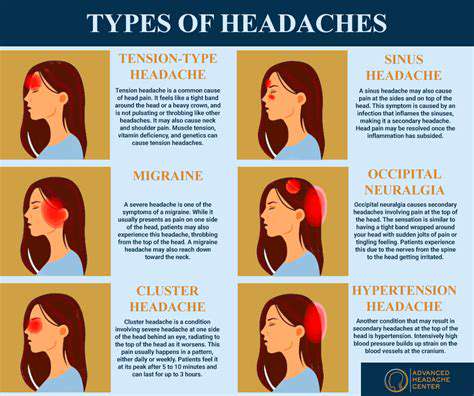Introduction to Sharp and Throbbing Headaches
Understanding the Causes
Sharp and throbbing headaches can be triggered by a variety of factors, ranging from lifestyle choices to underlying medical conditions. Common causes include tension, dehydration, sinus infections, and even hormonal changes. Identifying these triggers is crucial for effective management and prevention.
Additionally, certain environmental factors such as noise, bright lights, and strong odors can exacerbate these headaches. It's important to pay attention to potential triggers and patterns in headache occurrences, which can aid healthcare professionals in diagnosis and treatment.
Home Remedies for Relief
Home remedies can often provide quick relief from sharp or throbbing headaches. Simple techniques such as applying a cold compress to the forehead or the back of the neck can significantly reduce pain and inflammation. Herbal teas, particularly those containing ginger or peppermint, also provide soothing effects.
Staying well-hydrated plays a critical role in preventing headaches. Drinking plenty of water throughout the day can alleviate dehydration-related headaches. Moreover, maintaining a regular sleep schedule and practicing relaxation techniques, such as deep breathing or meditation, can help manage headache symptoms effectively.
Over-the-Counter Treatments
Over-the-counter medications such as ibuprofen, acetaminophen, or aspirin can offer relief for individuals suffering from sharp or throbbing headaches. These medications work by reducing inflammation and blocking pain signals in the brain. However, it’s essential to follow dosage recommendations to avoid potential side effects.
If headaches persist or worsen, consulting a healthcare provider is advisable. They may suggest alternative over-the-counter solutions or prescription medications tailored to individual needs, including muscle relaxants or anti-nausea medications.
When to Seek Medical Attention
While most headaches can be managed at home, certain symptoms warrant immediate medical attention. If headaches are accompanied by sudden vision changes, severe nausea, confusion, or loss of consciousness, it's critical to seek medical help. These symptoms may indicate a more serious underlying condition.
Additionally, if headaches become chronic, occurring multiple times a week, or disrupt daily activities significantly, it is vital to consult a healthcare professional. They can conduct necessary evaluations and recommend a comprehensive treatment plan tailored to individual headache profiles.
Common Causes of Sharp or Throbbing Headaches
1. Tension and Stress Induced Headaches
Tension headaches are a prevalent type of headache that often arises as a result of stress, anxiety, or muscle tension. They typically manifest as a constant, dull ache across the forehead or the back of the head.
Muscle tightness due to prolonged activities, such as sitting in front of a computer for extended periods, can exacerbate tension headaches. This is often accompanied by tightness in the neck and shoulders.
To alleviate tension headaches, it's crucial to identify and manage stressors in your life. Simple relaxation techniques like deep breathing, meditation, or yoga can be remarkably effective.
Regular breaks during work, combined with light stretching exercises, can help reduce muscle tension and prevent the occurrence of these headaches.
Incorporating regular physical activity into your routine can also improve blood circulation and relieve muscle strain, ultimately helping to prevent tension headaches from developing.
2. Migraines and Their Triggers
Migraines are intense headaches that can be accompanied by other symptoms such as nausea, vomiting, and sensitivity to light and sound. They often occur in phases, with warning signs, called auras, preceding the headache.
Common migraine triggers include hormonal changes, certain foods (like aged cheese and processed foods), and environmental factors such as bright lights or strong smells. Identifying and avoiding these triggers can significantly reduce the frequency and intensity of migraines.
Maintaining a consistent sleep schedule and managing stress levels through relaxation techniques can also help decrease the likelihood of migraine episodes.
For those who suffer from chronic migraines, keeping a headache diary can be beneficial. This allows individuals to track when headaches occur and potentially identify patterns or triggers that they can avoid in the future.
Effective migraine treatment may also include over-the-counter medications or prescription drugs that can be managed in consultation with a healthcare provider. There are also preventative treatments that some patients find useful, which can be tailored to one's specific needs.
3. Sinus Headaches and Their Management
Sinus headaches are caused by sinus inflammation and can occur alongside other symptoms like nasal congestion and facial pressure. They often feel like a deep, constant pain in the cheeks, forehead, or around the eyes.
Understanding the cause of sinus headaches is essential for proper management. Allergies or infections can contribute to sinus inflammation, leading to discomfort.
Over-the-counter decongestants and pain relievers can provide relief from the symptoms. However, addressing the underlying cause, such as treating an infection with antibiotics if necessary, is crucial for long-term relief.
Using saline nasal sprays or a humidifier can help maintain moisture levels in the sinuses, potentially preventing blockage and further headaches.
Additionally, practicing steam inhalation or using warm compresses on the face can also alleviate sinus pressure, contributing to a reduction in the frequency and intensity of sinus headaches.
Identifying Symptoms of Sharp and Throbbing Headaches

Understanding Headache Types
Headaches can be classified into various types, with sharp and throbbing headaches being among the most common. Recognizing the type of headache you have is crucial for appropriate management and treatment.
Sharp headaches are often characterized by sudden, intense pain, while throbbing headaches typically present as a pulsing sensation, commonly associated with conditions like migraines. Understanding these differences is the first step toward effective remedies.
Common Triggers and Risk Factors
Numerous factors can contribute to the onset of sharp or throbbing headaches. These can range from stress and dehydration to dietary choices and sleep disturbances. Being aware of your personal triggers can help you take preventive measures.
Additionally, lifestyle factors such as lack of exercise or excessive screen time can exacerbate headache symptoms. By identifying and managing these risk factors, you may reduce the frequency and severity of headaches significantly.
Treatment Options and Techniques
Effective treatment for sharp and throbbing headaches often involves a combination of medication and lifestyle changes. Over-the-counter pain relievers can provide immediate relief, but it is important to consult a healthcare provider for severe or chronic cases.
Beyond medication, techniques such as relaxation exercises, regular physical activity, and maintaining proper hydration have proven effective in managing headache symptoms. Developing a comprehensive approach can lead to long-term relief and improved quality of life.
Effective Remedies to Alleviate Pain

Natural Approaches to Headache Relief
Many individuals prefer to explore natural remedies for managing headaches, often finding relief through simple lifestyle changes. Herbal teas such as peppermint or chamomile can serve as soothing agents, helping to relax the mind and body.
Another effective method is the application of essential oils, such as lavender or eucalyptus, which can be used in aromatherapy or diluted for topical use. These options not only provide potential relief but also promote overall well-being.
Medical Treatments and Interventions
For more persistent headache issues, seeking medical advice may be necessary. Over-the-counter medications, such as ibuprofen or acetaminophen, can provide significant relief for many individuals suffering from acute headache episodes.
In some cases, healthcare providers may recommend prescription medications or alternative therapies like acupuncture. This personalized approach ensures that patients receive the best possible care for their specific headache types.
When to Seek Medical Attention
Understanding the Symptoms
Sharp or throbbing headaches can manifest in various ways, often accompanied by a spectrum of other symptoms that can vary in intensity. Common indicators include sensitivity to light and sound, nausea, and even visual disturbances. Understanding these symptoms is crucial as they can help pinpoint the type of headache you’re experiencing.
For instance, a sharp headache that presents suddenly might indicate a tension headache or even a migraine, while throbbing pain could be a sign of a cluster headache. Keeping a log of when these headaches occur and what symptoms accompany them can aid in identifying patterns and triggers.
Home Remedies and Lifestyle Changes
Implementing home remedies can often provide immediate relief from sharp or throbbing headaches. Staying hydrated is critical, as dehydration is a common headache trigger. Additionally, applying a cold compress to the forehead can help reduce inflammation and numb pain.
Moreover, lifestyle changes such as maintaining a regular sleep schedule, managing stress through relaxation techniques like yoga or meditation, and limiting caffeine and alcohol intake can significantly lower the frequency and severity of headaches. Regular exercise is also beneficial as it promotes overall well-being and reduces tension.
Over-the-Counter Treatments
For acute headache relief, over-the-counter (OTC) medications like ibuprofen, aspirin, or acetaminophen can be effective options. These medications work by reducing inflammation and alleviating pain. However, it's essential to follow the recommended dosages and be aware of potential side effects.
In some cases, using a combination of OTC medications may provide better relief. For instance, some individuals may find that alternating between different pain relievers enhances effectiveness while minimizing the risk of side effects. Always consult a healthcare provider before starting any new medication regimen.
When to Consult a Healthcare Professional
It's crucial to recognize when headache symptoms require professional attention. If you experience headaches that are unusually severe, persistent, or accompanied by neurological symptoms like confusion or difficulty speaking, you should seek medical advice promptly. Such symptoms can be indicative of a more serious underlying condition.
Additionally, if your headache is accompanied by a fever, stiff neck, or changes in vision, these could be warning signs that necessitate immediate medical evaluation. Keeping track of your headache history and discussing it with a doctor can lead to a more accurate diagnosis and effective treatment plan.